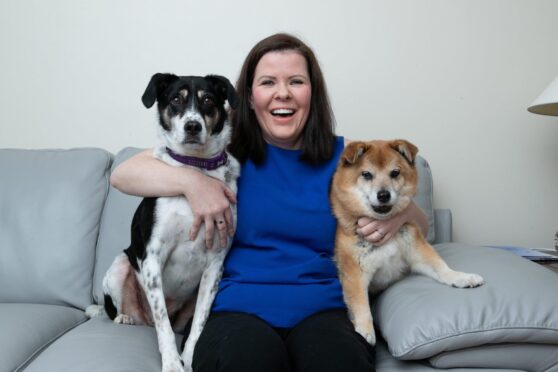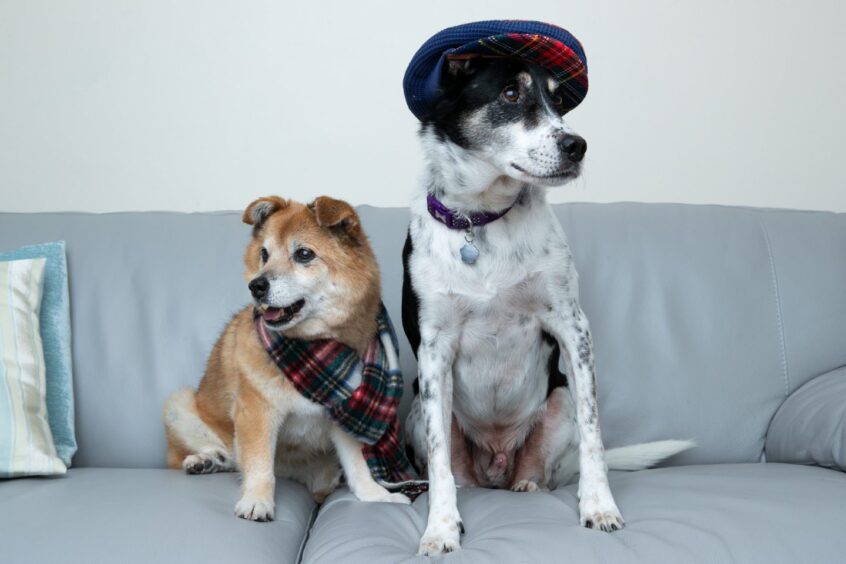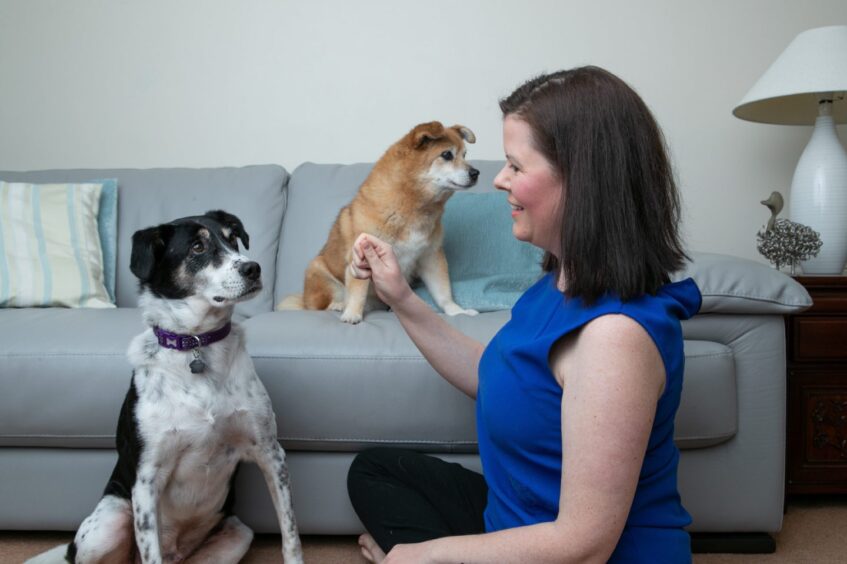
They are adorable dogs, brimming with life as they run along a Scottish country path in the winter sunshine.
It’s a stark contrast to what might have happened had they not been rescued by Scottish nurse Gillian Campbell.
Zhima, a South Asian village dog, and Labrador cross Ding Ding were whisked to safety and spared the fate of being turned into dog meat by cruel animal traders.
Gillian said: “I saved them from the dinner table in China because I couldn’t bear the thought of any dog undergoing such extreme cruelty. It’s an appalling trade in pets.
“Dog meat is a delicacy in some parts of China and other countries – completely unacceptable and cruel. It’s awfully shocking because dogs depend so much on love, care and respect from humans.”
Both dogs came from the Little Adoption Shop in Beijing via the London charity, All Dogs Matter.
“It took a while to help Zhima and Ding Ding to become happier and feel more confident in their new lives as pets in the UK but they are extremely appreciative and affectionate,” Gillian added.
Zhima, a reddish golden coated farm dog, is still cautious of strangers.
The gentle-natured 10-year-old is no bigger than a Corgi but with Pekinese markings and was rescued from a truck en route to market.
“It would have been a terrifying journey,” Gillian said.
Ding Ding, eight, thrives on attention and pats from anyone he meets. Both dogs understand commands in Mandarin Chinese, testament to their early days on the farms and streets.
Zhima responds in an instant to “Lái” as Gillian beckons her to come over.
Ira Moss, general manager of All Dogs Matter, said: “Lovely people like Gillian have adopted a couple of dogs from us. She has gone that extra mile.
“Her dogs came over from trade to a meat market.
“We rescue and rehome around 300 dogs annually from overseas and the UK and have worked with The Humane Society.
“Our work involves various charities in China and other countries.”
During Covid, the Ministry of Agriculture in China officially declared that dogs are companions and should not be treated as livestock.
It is believed to be driven by fears of animal to human diseases and a crackdown on the spread of rabies.
This meant a ban on their commercial slaughter and sale in China.
However, The Humane Society reports that illegal dog trading still takes place in China.
It says that, globally, an estimated 30 million dogs and 10 million cats are slaughtered annually for human consumption. Of these, approximately 10 million dogs and four million cats are killed each year in China alone.
A significant portion of the dog and cat meat trade in the country is linked to criminal activity, with many animals being stolen pets and strays taken from backyards and streets.
The journey to slaughterhouses entails cramming them into wire cages and transporting them for days, with many suffering from dehydration, injuries, suffocation and heatstroke, and some dying en route.
Although dog markets and slaughterhouses exist across China, the slaughter of dogs and cats during the annual summer solstice event in Yulin, in Guangxi Zhuang Autonomous Region, has become a symbol of the immense cruelty of the trade that sadly takes place every day.
But it says that, despite these atrocities, eating dog and cat meat is not widespread in China. The majority of the population does not consume it, and of the 20% who do, many have only tried it once or twice.
Other countries are reacting slowly – including South Korea, which recently announced plans to compensate farmers and other traders in the country’s dog meat industry before a formal ban comes into effect in 2027.
Almost half a million dogs were being bred for the dinner table, reported Korea’s Vice Agriculture minister, Park Beom-su, at a press conference in September.
Actress Kim Basinger, comedian Ricky Gervais and actor Peter Egan have also campaigned against dog markets in Indonesia.
Simon Cowell donated £25,000 to the Humane Society in 2018 to help the charity close a dog meat farm in South Korea.
The X Factor boss’s contribution to The Humane Society International (HSI) means more than 200 dogs and puppies bred for human consumption will now be saved, the charity said.
Cowell, who adopted Yorkshire terriers Squiddly and Diddly, has long been a supporter of the charity.
In 2018 he supported a campaign to ban a dog meat festival in Yulin, China, describing it as “sickeningly cruel”.

Enjoy the convenience of having The Sunday Post delivered as a digital ePaper straight to your smartphone, tablet or computer.
Subscribe for only £5.49 a month and enjoy all the benefits of the printed paper as a digital replica.
Subscribe © Andrew Cawley
© Andrew Cawley © Andrew Cawley
© Andrew Cawley